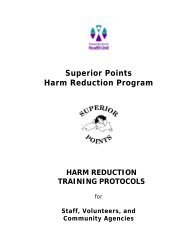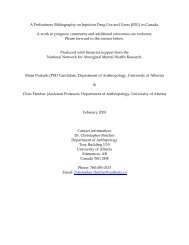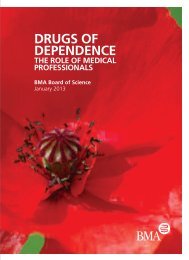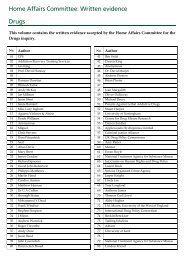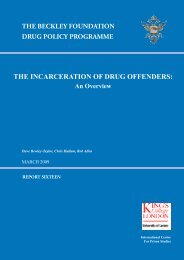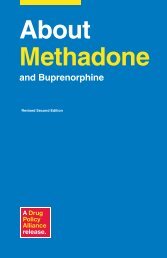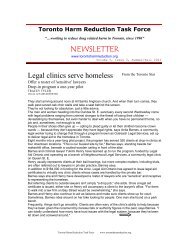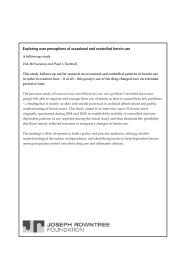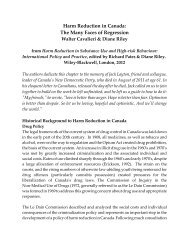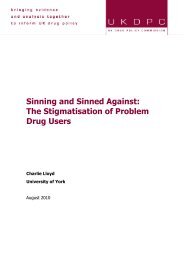Canadian Journal Addiction Medicine - Canadian Harm Reduction ...
Canadian Journal Addiction Medicine - Canadian Harm Reduction ...
Canadian Journal Addiction Medicine - Canadian Harm Reduction ...
Create successful ePaper yourself
Turn your PDF publications into a flip-book with our unique Google optimized e-Paper software.
the<br />
<strong>Canadian</strong> <strong>Journal</strong> of<br />
<strong>Addiction</strong> <strong>Medicine</strong><br />
an official publication of the <strong>Canadian</strong> Society of <strong>Addiction</strong> <strong>Medicine</strong><br />
challenges and opportunities not seen in other settings. OST<br />
programs in prisons come under much closer scrutiny than<br />
do community programs, and as such, include enhanced<br />
security protocols to ensure the safety and security of the<br />
facility (e.g. requiring offenders to be searched prior to and<br />
after dose administration, waiting 20 minutes following<br />
dosing, and not being able to provide carries to reduce the<br />
potential for methadone diversion). As a result of these<br />
enhanced protocols, working within a correctional setting<br />
can be challenging which can make developing a therapeutic<br />
relationship more difficult than working in the community.<br />
CSC has developed policies for the use of Suboxone in cases<br />
of exceptional circumstances when an individual is unable to<br />
tolerate Methadone.<br />
Discharge planning of offenders can be difficult. Adding<br />
the need for Opiate Substitution Therapy increases the<br />
complexity in the discharge process. With the understanding<br />
of the importance of continuity of care CSC has worked<br />
hard networking with community providers and clinics and<br />
has established procedures for discharging to the community<br />
and for the transfer of offenders to and from provincial<br />
correctional systems.<br />
Cost and Cost Effectiveness of<br />
MMTP<br />
Dr. Greg Zaric<br />
Associate Professor of Management Science at the Ivey<br />
School of Business, University of Western Ontario,<br />
Associate Professor of Epidemiology and Biostatistics at the<br />
Schulich School of <strong>Medicine</strong> and Dentistry, University of<br />
Western Ontario<br />
Policy makers in Canada must make difficult resource<br />
allocation decisions in the presence of limited budgets.<br />
Methadone maintenance treatment is one of many possible<br />
competing uses of public funds. To make good decisions,<br />
policy makers need high-quality information on the costs<br />
and health consequences of their investment choices. In<br />
this talk I provide an overview of the literature on the<br />
cost and cost effectiveness of methadone maintenance<br />
treatment programs. I will review methadone costing studies<br />
from Canada and several other countries; provide a brief<br />
introduction to the topic of cost effectiveness analysis and<br />
its role in policy and public funding decisions; and then<br />
selectively discuss the literature on the cost effectiveness of<br />
methadone maintenance.<br />
Dialectical Behaviour Therapy<br />
Adaptations for the Treatment<br />
of Substance Use Disorder and<br />
Borderline Personality Disorder<br />
Dr. Shelly McMain<br />
Head of Personality Disorders Treatment, Research and<br />
Capacity Building and of the Borderline Personality<br />
Disorder Clinic at the Centre for <strong>Addiction</strong> and Mental<br />
Health in Toronto<br />
Dialectical Behaviour Therapy (DBT) is an innovative<br />
treatment that was originally developed by Marsha Linehan for<br />
the treatment of suicidal patients with Borderline Personality<br />
Disorder (BPD). This presentation addresses how DBT has<br />
been adapted for the treatment of patients with co-occurring<br />
substance use disorders and Borderline Personality disorder.<br />
Accumulating research evidence supporting the effectiveness<br />
of Dialectical Behaviour Therapy (DBT) for the treatment<br />
of BPD and concurrent substance use disorders. DBT blends<br />
traditional Cognitive Behaviour Therapy with techniques<br />
from acceptance-based traditions. In this presentation,<br />
participants will learn about DBT’s assumptions about<br />
patients and how they can help to promote compassion and<br />
decrease burn-out in clinicians. Participants will learn about<br />
strategies that can be used to increase patient’s commitment<br />
and motivation to address substance problems. As well, we<br />
will consider how and when to prioritize the treatment of<br />
concurrent symptoms such as post traumatic stress. Finally,<br />
participants will learn strategies that can be used to avert and<br />
resolve crises.<br />
Adolescent <strong>Addiction</strong><br />
Dr. Sharon Cirone<br />
<strong>Addiction</strong>s consultant to the Child and Adolescent Mental<br />
Health team at St. Joseph’s Health Centre in Toronto<br />
“Doctor, I think my son is on drugs, can you help him?”<br />
Have you had concerned parents and families approach you<br />
for assistance and intervention with their teens who may be<br />
using illicit substances? Where do you start? How do you get<br />
the adolescent to come to see you? How can you support the<br />
parents during this stressful time?<br />
This presentation will offer information on the most recent<br />
epidemiologic profile of youth substance use and a practical<br />
approach to engage adolescents in your practice in a discussion<br />
Volume 3 No. 2<br />
17




